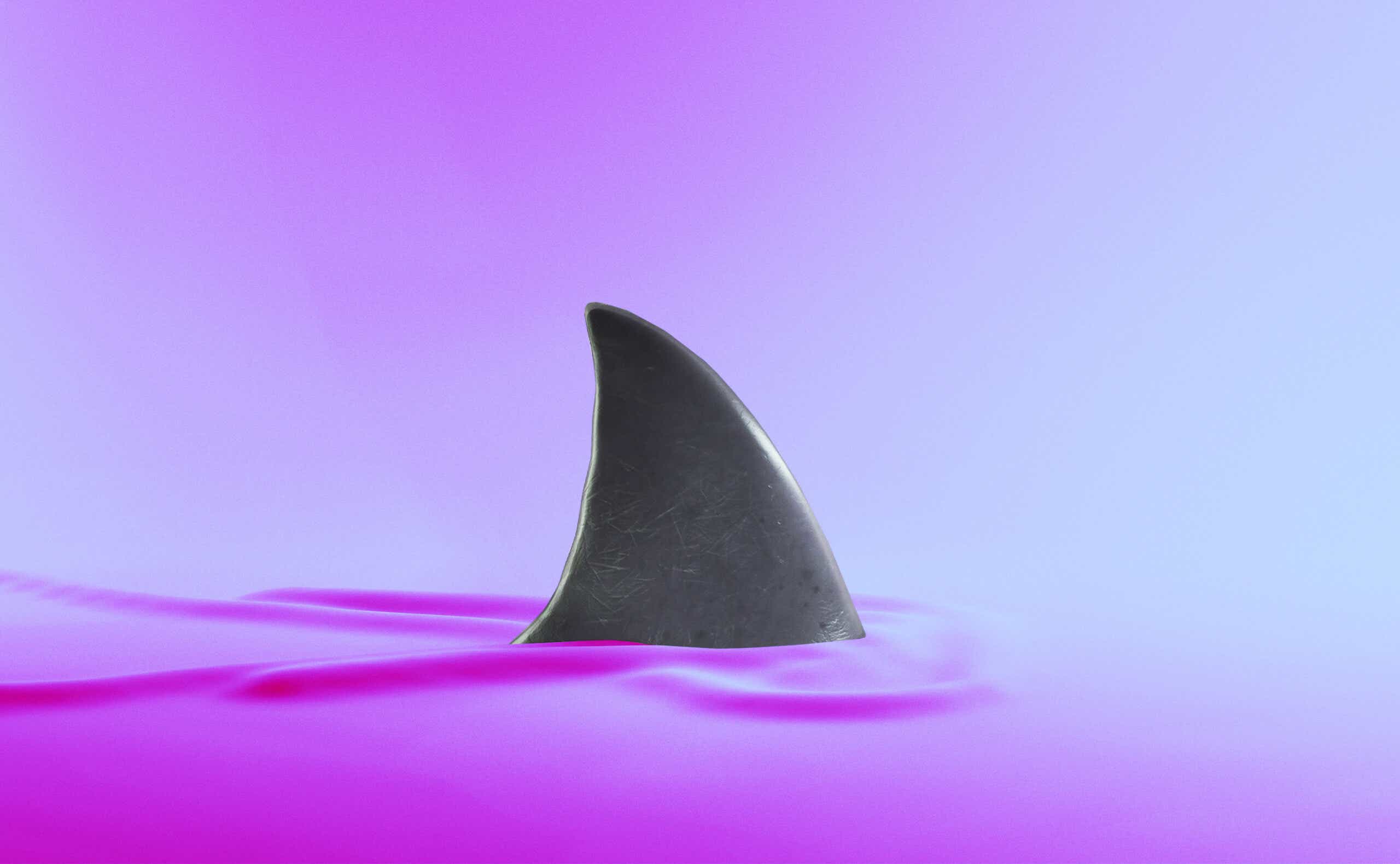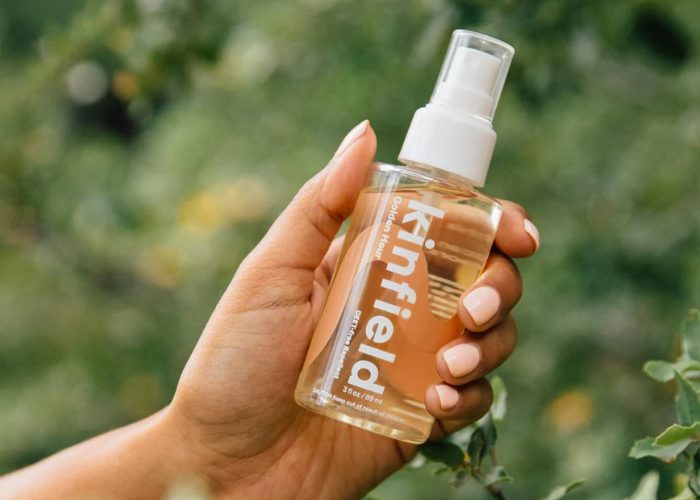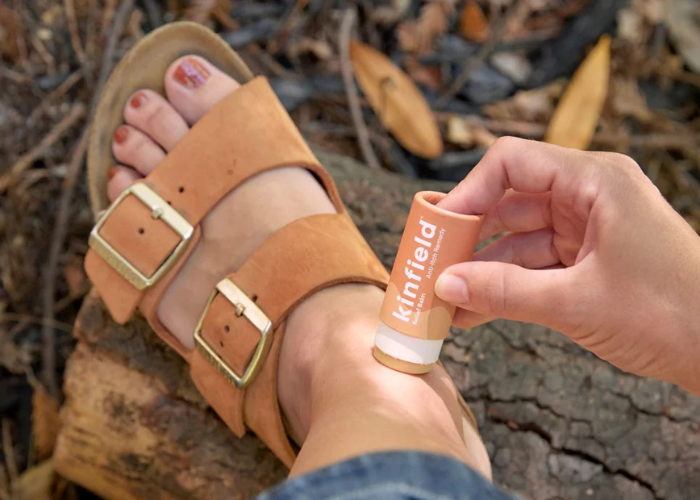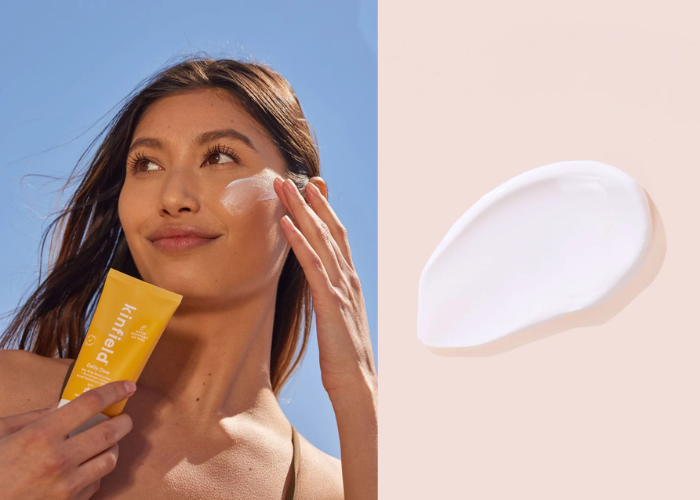There’s no singular path to success in business, but the most entertaining, compelling, and terrifying approach might be pitching your product on Shark Tank.
Each week, viewers of the ABC hit watch hopeful moguls face a panel of seasoned investors, and snagging a great deal could completely change their lives — unless they flounder in front of a national audience. With all that dramatic lighting, sharp music, and lightning-fast negotiating, what’s unfolding on screen always seems intense to us at home, but what is it really like to jump into the tank yourself?
We asked someone who knows firsthand: Nichole Powell, the CEO of Kinfield, an outdoor essentials company with products so great that we feature them in Katie’s Shop. (And we did so before she even pitched on the show, thank you very much.)
Growing up in “a super outdoorsy family” in Minnesota, Powell was accustomed to being “covered with icky, sticky bug spray” that contained all sorts of questionable chemicals. Years later, when she moved to California and spent even more time outside, she realized that the products meant to protect her from the elements were still the same unsatisfactory formulas that had been around since she was a kid. “I was looking at all of these beautiful, sustainable modern brands — everything from makeup to hair care to home cleaning — and really feeling like the outdoor industry could use some of those same clean products for all of our adventures,” she tells us.
In the summer of 2019, she launched Kinfield, which uses a unique strain of citronella from Indonesia as the basis for vegan, cruelty-free bug spray that’s safe for both people and the environment. Despite launching just before the pandemic, Kinfield saw steady growth, boosting sales by about threefold each year. But the business hit another level when Powell took her products to Shark Tank.
In an episode that aired in January, she pitched to Mark Cuban, Barbara Corcoran, Kevin O’Leary, Lori Greiner, and Tony Xu. Considering her business was already finding its footing, why pursue a shark? Powell says it’s all about taking the company to the next level. She was seeing strong sales through her website, but because bug spray and sunscreen are products that people think to buy right before a beach day or camping trip, she was eager to get Kinfield into brick-and-mortar retail stores, where purchases could happen faster and more conveniently — but she had no experience with that model.
“What I really saw in Shark Tank was an opportunity to get to work with investors who have done that over and over again,” Powell says. “These sharks can take a brand like ours into retail in their sleep.”
She went into the tank offering a 5 percent stake in Kinfield for $250,000. After getting offers from four out of five sharks, she walked away with a deal in which Xu and Corcoran collectively gave her the $250,000, but they snagged 10 percent of the company. We spoke to Powell about how she got on the show in the first place, what she did to prepare, the experience of wheeling and dealing with the sharks, and much more.
How did you make it onto Shark Tank?
We got a note from a casting producer asking me to appear on the show, and I didn’t realize the magnitude of what it was. So it wasn’t until many, many, many weeks later when a friend of mine, an investor, brought up the idea of whether I’d ever thought about being on the show. Later, I was searching my inbox and typed in Shark Tank and found this email again. I’m looking at this email seven and a half months later, and I’m like, “Oh my gosh, did I just make the biggest mistake of my career?”
Fortunately, I called him and apologized [for not responding earlier], and he was kind enough to hear me out. We did our application and audition video the same way that anyone does, and from there, it all happened really quickly. From the day I called that producer back to the day we filmed was about six weeks.
So it took seven months to respond to the email and six weeks to get onto the show.
The producer was laughing when I submitted my application because we had a really short window for that, too. He was like, “Alright Nichole, you get two awards: One for the longest response time to that first email, and two for the fastest turnaround for your application.”
How did you prepare before filming the episode?
The only part of Shark Tank that’s scripted or pre-planned is that first pitch you see as soon as the entrepreneur walks into the tank. You hit your mark, you wait for a minute while the cameras move around you, then you have your 90-second pitch. And that’s it. All of the rest of it is totally unscripted. The sharks have never seen your brand or heard your story before.
I wanted to be as prepared as possible, and I knew that I could absolutely nail that pitch. I wanted to have that so tight that I could do it in my sleep. You get to work with a producing team, who helps refine your pitch and gives feedback, which is enormously helpful. From there, it was a matter of memorizing it and being able to do it in any circumstance. I started practicing it while I was driving or while I would be out walking in the city. That way, if Mark Cuban made a face, I wasn’t going to be like, “Oh my gosh, is he hating this?” and miss my next sentence.
Did you know which investors would be in the room, and did that affect your pitch?
They did tell me before — not long in advance, but I did know who I would be walking into the room with. But my pitch would have been the same with anyone.
The segment we see on the show lasts just a few minutes, but how long were you actually in there negotiating?
My producer told me I was in the tank for a little over 45 minutes. It felt like two minutes, I swear. I walked out and was like, “Oh my gosh, was I speaking English?" It’s such a surreal experience to be in that tank — it’s exactly like what you see on TV. It’s just you and the sharks in the room. All of the crew and the cameras are hidden, so it feels very intimate.

Your vision for taking the business from online into retail stores was one of the things the sharks challenged you on — they questioned how it would affect your bottom line. What was it like to defend that to the investors?
The beauty of being able to sell your product on your own website is you take that profit in full; you’re responsible for shipping it, but you get the full value of that purchase. So when you work with a retail store, you’re giving them a cut, but what they give back to you is widespread exposure and the convenience of being at a store that’s right down the street, instead of having to wait for it to be shipped. When the sharks were pushing me on it, their questions were things we as a team had already talked about, so my focus was on sharing our thinking in making the decision.
You ended up with offers from four out of five sharks. Once you realized how successful your pitch was, how did you decide what kind of deal to make from there?
The first three offers I got [from Barbara, Kevin, and Lori] were all for both equity and a royalty. With a royalty, that means for every product we sell on our website, we’re then automatically taking off a percentage of that sale and paying that shark back. And while that is a way of getting some capital, we have access to other capital — and I really went into Shark Tank wanting to find a business partner, someone who’s really excited about what we’re doing and feels they can actually add value. And to me, an offer involving a royalty is more an offer of capital rather than of expertise.
And then Tony said, “I’m in it for the long haul. I just want equity, so no royalty from me. I just want to be in this business with you.” That spoke volumes about the potential he saw in our business and the kind of investor he wanted to be. Then when Tony made that offer, Barbara ended up changing her offer to match his once she saw my enthusiasm for an equity-only offer rather than something with a royalty. There’s no one offer that’s right for every business, but that’s what I was looking for, so I was glad to see there were investors who wanted to meet in that same place.
They didn’t show it, but Mark very kindly was also sort of encouraging me [after he’d already dropped out], like, You have great numbers — you don’t need a royalty!
What have your interactions with Tony and Barbara been like since making a deal on the show?
It’s still kind of all unfolding. It’s happening very quickly because it just aired, and we filmed not long before that. Afterward, you’re going through legal documents, and it’s a process just like any other investment.
But I will say it’s been enormously interesting to be able to work with people who are such expert investors. It’s been really neat to see their enthusiasm for the brand. Obviously Tony is very, very savvy in the world of start-ups. The day of filming, Barbara sent me a very sweet email, congratulating me, wishing me luck with the airing, and just saying to soak it all in. She’s so busy, so for her to take the time to send me that personal note felt quite special.
Have you already seen an impact on your business since the show aired?
Our episode aired in January, and we sell products that are largely used in the summer, so we weren’t sure what sort of response we’d get. We ended January 2023 around 28 times higher than January 2022. It was a really incredible response. Our accountant was thrilled. She was like, “This. Is. Great.”
If you’ve never experienced Kinfield’s superb formulas for yourself, take a page out of Barbara and Tony’s books and give them a try. Here are a few of our favorites:
Golden Hour Mosquito Repellent
Kinfield
You know that awful scent you can instinctively smell as soon as someone says “bug repellent”? It’s nowhere to be found in this stellar spray, made using a unique strain of citronella found in Indonesia. It’s actually a treat for your nose, if you can believe it — but more importantly, exhaustive testing proves it’s extremely effective, too. (It’s also available in the form of travel-friendly wipes.)
Relief Balm Anti-Itch Remedy
Kinfield
If you got stuck without your Golden Hour and the bugs found you, fear not. This soothing balm, made with cajeput and eucalyptus oils, instantly relieves the itching, inflammation, and irritation caused by these blood suckers.
Daily Dew SPF 35 Hydrating Face Sunscreen
Kinfield
Kinfield does make sunscreen for your whole body, but it’s still pretty chilly in lots of the country. So if your face is the only thing seeing the light of day for the time being, this excellent water-resistant sunblock will hydrate your skin while also offering all the good-smelling vibes of other Kinfield products.












